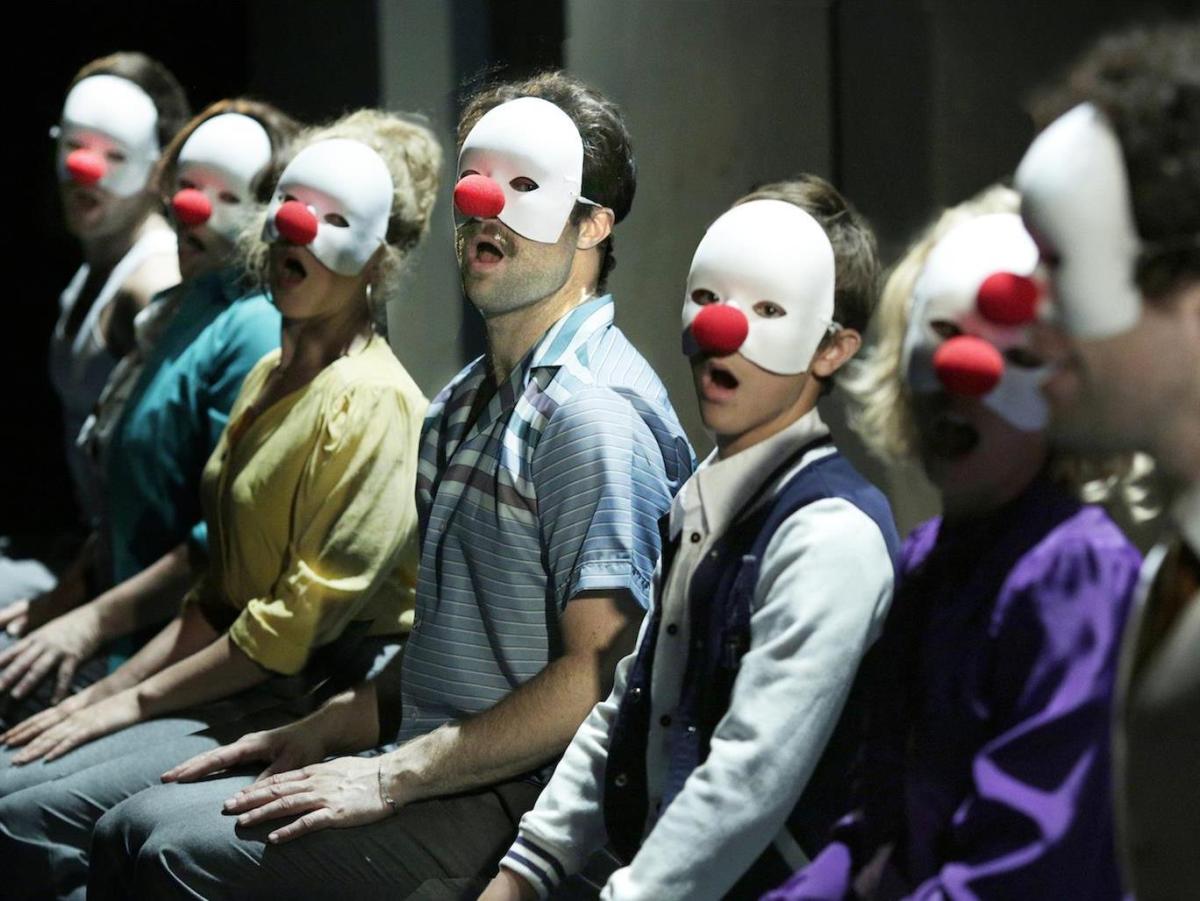Ben Hall, Margi de Ferranti, Elise McCann, Tamlyn Henderson, Isaac Shaw, Katrina Retallick, Stephen Anderson. Image by Helen White.
Falsettos is the story of Marvin, a Jewish father, who leaves his wife and young son for his handsome male lover, Whizzer, but somehow still wants to have it all. William Finn composed this musical challenge to old definitions of family back in 1981, adding a second act ten years later which dramatised Marvin’s ‘growing up’, the impending barmitzvah of his son and the death of Whizzer from a mysterious new disease.
In 1992, Finn then seamlessly combined both acts into Falsettos, creating what was an early landmark drama to deal with AIDS and gay romance. The musical that year won Tony Awards for Best Original Score and Best Book (with James Lapine).
And Finn’s innovation goes beyond the subject matter. With a non-stop score here delivered by a single grand piano, and all words replaced by song and movement, Falsettos leaps immediately to the heart of each scene. With every note, patter, song and action driven by character, the show has an engaging dramaturgical pace.
Stephen Colyer’s modestly staged production, with movable pine boxes serving as tables, chairs, beds, coffins and backdrops, is distinguished instead by a muiti-talented cast. The first act is rife with family conflict – especially when Marvin’s wife Trina begins an affair with his analyst, Mendel.
Colyer expertly moves his cast through these snappy scenes of discord and awkward adjustment. Only sometimes do they fail to fully articulate Finn’s rapid-fire wit, and rise to that American chutzpah and delivery required in a Broadway musical called, after all, Falsettos.
Katrina Retallick is a standout as the edgy Trina, especially as she pounds and sings away her doubts on the step-up machine; while Tamlyn Henderson brings a beautiful sincerity and striving to Marvin. Young Isaac Shaw (alternating with Anthony Garcia) is a natural as Marvin’s son, with all the drollery of a thirteen-year-old Woody Allen in spectacles. Stephen Anderson as Mendel tries to help everybody but has his own entertaining shrink demons; Ben Hall is appropriately gorgeous, if thin-voiced, as Whizzer.
Yet more threads of love and family emerge in the second half, with the arrival of Margi de Ferranti and Elise McCann as the neighbouring lesbians, each with a nice Jewish edge to counter the sentimentality. And here the tears do flow, as Whizzer’s health declines and songs of love and loss stir to climax.
The ensemble-style modernity of Finn’s original staging is artfully reinvented by Colyer and his team. Part of that modernity is Finn showing relationships as they are, in all their gay and straight forms and all their frictions – as true today as in 1992. Underpinning the adult wit and emotional truth is a masterful Nigel Ubrihien at the keyboards in his upstage nook (also co-musical director with Chris King).
Falsettos has a good wise and warm word for everyone, even those, I suggest, who can’t stand musicals.
Rating: 4 out of 5 stars
FalsettosBook by William Fin and James Lapine
Music and lyrics by William Finn
Directed by Stephen Colyer
Darlinghurst Theatre Company
Eternity Playhouse, Darlinghurst
www.darlinghursttheatre.com
7 February – 16 March






